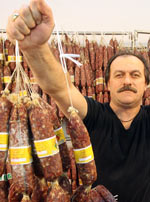If they pass their exams, the first class of 16 students – all of Turkish descent – will qualify with a certificate in “Meat Processing with Doner Kebab Production Specialization” at Hamburg’s Vocational School for Gastronomy and Nutrition.
“Getting a qualification in kebab production should help me stay in the branch in the long term and that is what I want to do,” student Dursun Atekin, 25, told Reuters. “We do some theory and some practical work and it is good because we can put into practice what we learn.”
Clad in white overcoats and plastic gloves and caps, the students attend classes twice a week. They learn to cut meat properly, calculate how much meat to put on a skewer and how to avoid the spread of germs.
The kebab meat, traditionally lamb, is usually served in pita bread with a handful of salad. Germany is trying to improve the integration of people of Turkish descent.
Many came as unskilled laborers after World War Two and contributed to the country’s economic boom but now politicians and community leaders are worried that many Turkish teenagers are leaving school early with few qualifications.
“Mainly people with migrant backgrounds and Turkish people work in this business but few have qualifications,” said Kazim Abaci, head of Companies Without Borders, an association set up in 2000 to help boost integration in the workplace.
“We want to give those people a better chance and make them re-employable.” Atekin is one of eight students on the course who work at Celic Doener GmbH, a kebab producer based in Hamburg which delivers meat all over Germany and Denmark.
“The course motivates our workers as they get trained while working without losing pay. It is a signal they will be needed in the company,” said company owner Ertan Celik.
Alongside sausages, kebabs are one of Germany’s most popular fast foods.
With its roughly 300 kebab shops, the industry employs 2 000 to 3 000 people in Hamburg alone and tens of thousands of people in Germany as a whole.

